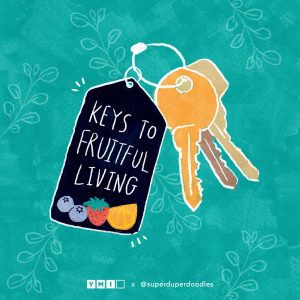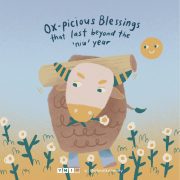Why I Believe In the “Prosperity Gospel”
I grew up in the heat of the Prosperity Gospel movement.
My early life of faith featured sermons on how to “believe to receive” or “name it to claim it”, and how God would give you everything you wanted (the job, the house, the holiday, the car) if you did what He said, believed hard enough, and tithed enough.
I remember the landscape vividly, where our family knew parents unable to pay school fees because they had resigned from jobs to work full time on the church building project, and yet we also knew others who would proclaim that their modern luxury car was a result of the blessing of God.
It was often difficult to reconcile the two, because those who struggled financially looked like their faith was less than those who didn’t. Was it really that they didn’t believe enough? Trust God enough?
Yearly offerings were often preceded by prayer meetings where congregants would bring prayer requests or situations of need and difficulty to God, and then make promises of financial commitments. I heard of families who tithed from debt, or on credit cards, hoping that this would somehow convince God to bless them enough to pay their existing debts down.
I’m wary of writing about this, because I was not one of the individuals who made these commitments, and I cannot know what God really asked them to do. But at the same time, in my reading of Scripture, I am not confident that God works that way—where, if you are a good Christian and tick all the boxes, you will have a flash car and house, and several investment properties.
Instead, in Scripture I see:
- A God who provided food for the people of Israel in the desert (Exodus 16:4-18)—and only what they needed for each day.
- A starving woman who offered a meal to the prophet Elijah but was not “blessed” in return with a cupboard full of jars of oil and flour—just one vessel that didn’t run out (1 Kings 17:7-14).
- Jesus teaching His disciples to pray, “Give us today our daily bread”, not “Give us all of the bread so we can be bread-lionaires and store all our bread in the bank” (Matthew 6:11).
More than a numbers game
I read this incredibly challenging quote by A.W. Tozer in his book, God Tells the Man Who Cares:
We are affected by a kind of religious tic, a deep inner necessity to accomplish something that can be seen and photographed and evaluated in terms of size, numbers, speed, and distance.
We travel a prodigious number of miles, talk to unbelievably large crowds, publish an astonishing amount of religious literature, collect huge sums of money, build vast numbers of churches and amass staggering debts for our children to pay.
Christian leaders compete with each other in the field of impressive statistics.
Ouch.
Because, for years, I had also grown accustomed to defining ministry success by numbers, popularity, scale, and other more carnal measures of success.
And to be honest, it can be easy to fall into the thinking of, “Oh God must be in it because it is growing . . .” To some degree I believe this can be true, but none of the numbers mean anything if people are still living ungodly, unchanged lives.
Not too long ago, a friend sent me an article on an anthropological study, titled “Prosperity Gospel within African Communities”.
What was so different about the study was that for these communities, their perspective of “prosperity gospel” wasn’t manifested in flash cars, boats, and lifestyle properties.
Prosperity, to them, was having relationships, having support, sustaining those who were in need—a type of blessing that was indicative of a flourishing community where everyone was provided for and included.
When I read the article, I found myself thinking, “Wow, that type of prosperity is actually pretty consistent with what I understand of the Christian faith.” It was an echo of what is detailed in Acts 4:32-35, which is a far cry from what we experience at times in the West.
I guess where I’m going today is, when it comes to prosperity, blessing, and success, we have grown too accustomed to measuring these things as most of the world does.
On the flip side, however, because of the way this materialistic “gospel” goes against the actual gospel, some of us may wind up throwing the baby out with the bath water and end up with the whole, “Life sucks, expect nothing from God” sort of theology. Which isn’t right either.
What can we expect from God?
Perhaps some of you feel that you’re not experiencing any kind of prosperity (material or relational, money or sense of community and support). I’m sorry it’s been so tough. I can only say that while I too have had times of loneliness, difficulty and struggle, God has always met me where I needed Him to, even when it’s not at the time or in the manner I had wished for.
I think of Christ’s words in the famous Sermon on the Mount, that God provides for the sparrows of the air and the flowers of the field, and He loves us infinitely more, so will He not provide for us? (Matthew 6:25-34)
And the Apostle Paul who says he is content with everything because he has Christ (Philippians 4:14).
I’m going to say something really controversial right now. I still believe in the “prosperity gospel”.
But not the kind that promises me all my material hopes and dreams if I can put God in a headlock or twist His arm. It’s more of the ones set out in Scripture as below:
Jeremiah 17:7-8: “But blessed is the one who trusts in the Lord, whose confidence is in Him. They will be like a tree planted by the water that sends out its roots by the stream. It does not fear when heat comes; its leaves are always green. It has no worries in a year of drought and never fails to bear fruit.”
Psalm 34:8: “Blessed is the one who takes refuge in Him.”
Friend, I do believe there is a place (and a genuinely wonderful meaning) for prosperity in our lives of faith. But it is closer to the idea of flourishing, a sense of okayness, of happiness that stems from rightness with God; of things being stable and secure because God holds them.
I recently thought of a money-related decision I had made that seemed like the wrong one, even though I had made it after prayerful consideration. In the midst of my reflection, I felt a pause and a challenge—why did I expect the kingdom of God to only manifest in the form of cold hard cash?
Other than the money side of things, had there been emotional and practical blessings to the decision I made? Yes. God’s fruitfulness had worked in my life through the decision I felt very clearly was what He wanted me to make. The benefit—the prosperity—of the decision had outworked in my life in ways other than financial advancement.
There are certainly times we’re blessed in more tangible ways. I recall the season I purchased my second home. It was literally miracle after miracle, from accidentally driving past it one afternoon and spotting the “For sale” sign, visiting the open house at the same time as the head of sales for the developer who had listed it, getting it for exactly the price I needed, and financed at the eleventh hour. I have no doubt in my mind that God made a way for me to purchase that home.
But there are other parts of God’s provision in our lives that we may not have noticed or given much thought. Such as a conversation at the exact time that you needed it. A moment of true wonder at God’s creative hand—in the way the clouds look as the rain parts, a beautiful sunset—reminding you how majestic and omnipotent He is, even on nightmarish days. And unopened doors can still result in new and unexpected opportunities beyond what we’d ever imagine.
Our God loves us. More than sparrows and flowers. He’s got us, and in Him is all the prosperity we ever need.













Leave a Reply
Want to join the discussion?Feel free to contribute!